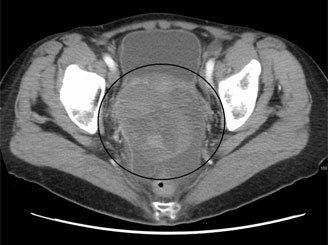Virus May Be Active Against Advanced Ovarian Cancer
An oncolytic herpes simplex virus had significant efficacy against ovarian cancer when used alone and in combination with standard chemotherapy treatment.
Ovarian cancer as seen on CT; source: James Heilman, MD

An oncolytic herpes simplex virus, 34.5ENVE, had significant efficacy against ovarian cancer when used alone and in combination with standard chemotherapy treatment doxorubicin, the results of a new preclinical study published in Clinical Cancer Research show.
According to background information in the study, ovarian cancer recurrence is thought to be related to a small subpopulation of cancer stem-like cells that develop a resistance to chemotherapy. When isolated, these tumor cells were found to have a higher nestin expression, making a treatment that targets nestin-expressing cancer cells a therapeutic goal.
The oncolytic herpes simplex virus 34.5ENVE is engineered to target cancer cells that overexpress the protein nestin and to inhibit the growth of blood vessels to tumors.
In this study, Balveen Kaur, PhD, professor of neurological surgery at the Ohio State University Comprehensive Cancer Center, and colleagues tested the antitumor efficacy of 34.5ENVE in a series of ovarian cancer cell lines, mouse tumor cells, and human tumor cells.
Results of the study showed that treatment with the virus reduced cell viability of ovarian cancer cell lines and in the mouse and human ovarian tumor cells. The researchers also tested the combination of 34.5ENVE with doxorubicin in mice with intraperitoneal ovarian cancer tumors and found that the two treatments worked together to increase apoptosis in ovarian tumor cells. In fact, the combination of doxorubicin and 34.5ENVE resulted in a prolonged survival with an average survival of 58 days for treated mice compared with 32.5 days for control mice.
“Our findings suggest that this could be a promising therapy, and we believe it should be further developed for the treatment of recurrent or refractory ovarian cancer in humans,” Kaur said in a press release.